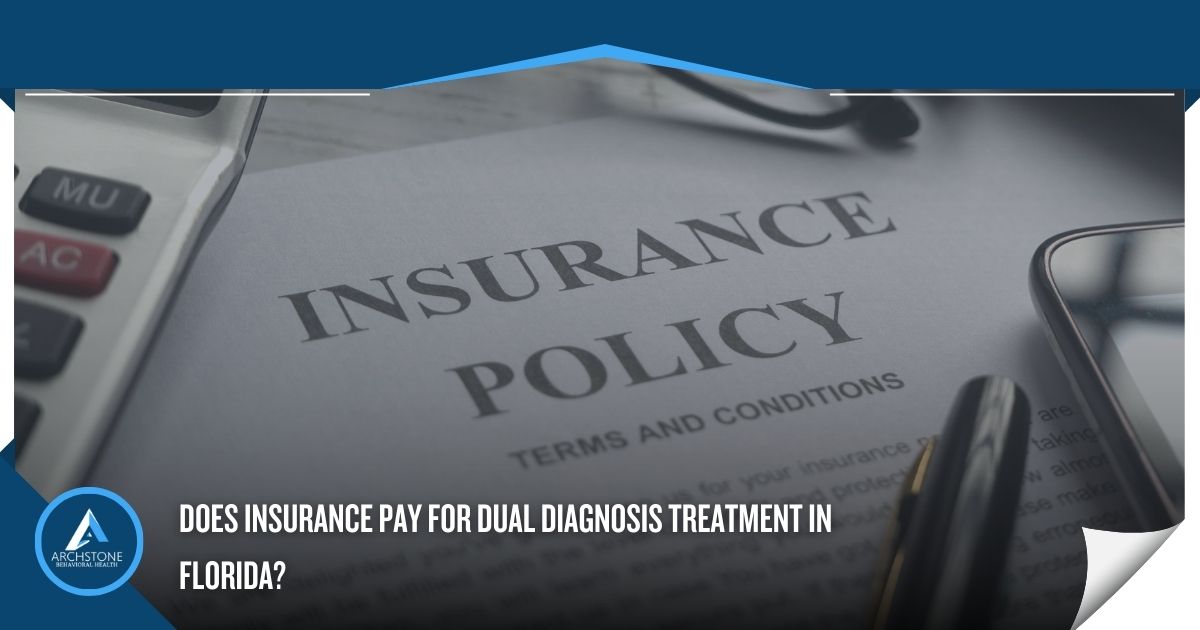Does Insurance Pay for Dual Diagnosis Treatment in Florida?
Get Help Now
Millions of people in the United States live with mental health issues. Millions of people also struggle with drug and alcohol abuse or addiction. In some cases, people live with both substance abuse and mental health conditions. This is called a dual diagnosis.
Research from 2020 revealed that about 17 million adults in the US met the criteria for a dual diagnosis. People who live with both conditions require comprehensive dual-diagnosis treatment programs that support long-term recovery.
However, many people with a dual diagnosis do not get the help they need to recover. For some, concerns about paying for treatment may be a barrier between them and the treatment they need.
Fortunately, insurance may pay for dual diagnosis treatment programs. This article will detail how to find out if dual diagnosis treatment will be covered by your health insurance plan.
Contact the Archstone Behavioral Health specialists now to explore your addiction and mental health treatment options.
What is Dual Diagnosis Treatment?
A dual diagnosis occurs when someone has a mental health condition and substance use disorder (SUD). For example, if someone with depression also had alcohol use disorder, they would have a dual diagnosis. Some people refer to this as a co-occurring disorder.
Dual diagnosis treatment refers to simultaneous treatment for a mental health condition and SUD. During treatment, people participate in treatments and therapies that simultaneously address the complex roots of both conditions.
Participating in dual-diagnosis treatment gives people the support and treatment they require to manage mental illness and SUD. It is crucial to treat both conditions at the same time so one does not interfere with the other.
What to Expect in a Dual Diagnosis Treatment Program
Florida has many addiction treatment centers. Some provide treatment for addiction and mental health disorders. Knowing what to expect during treatment can help you stay committed to it, even when challenging.
You may attend inpatient treatment or participate in an outpatient rehab program. The level of care you need will depend on many factors. These factors include the severity of your addiction, your mental health needs, general health, and more.
Here is an overview of what to expect during dual diagnosis treatment.
Assessment
Before starting treatment, your treatment team will evaluate your specific needs. The assessment will consist of questions about your substance use. It may also require a medical and mental health history, lab testing, and more.
Detox
Your treatment facility may advise an inpatient detox program or recommend an outpatient detox. During a medically-supported detox program, your treatment team will monitor and treat your withdrawal symptoms.
Your detox treatment plan may include:
- Medications to reduce cravings and other withdrawal symptoms
- Emotional support
- Mental health treatment, including medications, counseling, and group therapy when appropriate
- Round-the-clock supervision and access to treatment
- A safe, secure environment
The treatment you receive during detox will allow you to have a safe, complete detox.
Treatment
After completing a detox program, you may begin your mental health and substance abuse treatment program. A dual-diagnosis treatment plan may include:
- Medications
- Mental health treatment
- Psychotherapy and behavioral therapies
- Group and family therapy
- Exercise, nutrition support, mindfulness, and other holistic therapies
- Relapse prevention education
- Coping skills
- Aftercare planning
Participating in evidence-based and holistic therapies will help you identify and address the behavioral, physical, and emotional aspects of your dual diagnosis. You will develop the tools and resources to manage your mental health substances while learning to prevent relapse.
Does Insurance Pay for Dual Diagnosis Treatment?
In many cases, mental health care and drug and alcohol addiction treatment is covered by insurance. The 2010 Affordable Care Act prevents insurance companies from denying coverage for dual diagnosis treatment centers and addiction recovery services.
If you have health insurance, your plan likely will cover some or all of the cost of dual diagnosis treatment.
However, each insurance plan is different. You must verify the details of your specific insurance plan to determine which services and programs your plan covers. There are several ways to verify your insurance. You may:
- Call the number on the back of your insurance card. Speak to a representative to learn what programs and treatments your insurance plan covers.
- Explore your insurance company’s website for details about your insurance plan.
- Ask the insurance specialists at Archstone Behavioral Health to verify your insurance and navigate your coverage.
Many treatment centers have staff members who can verify insurance and explore alternative payment methods if necessary. Contact the Archstone Behavioral Health specialists now to learn more about insurance coverage for dual diagnosis treatment.
Find Dual Diagnosis Treatment in Florida
If you or a loved one needs treatment for addiction and mental health conditions, you are not alone. Compassionate, effective treatment is available at Archstone Behavioral Health.
Contact our intake specialists now to explore your treatment options or schedule an intake. Our staff will be happy to answer questions. We can also verify your insurance details so that you can get started as quickly as possible.
